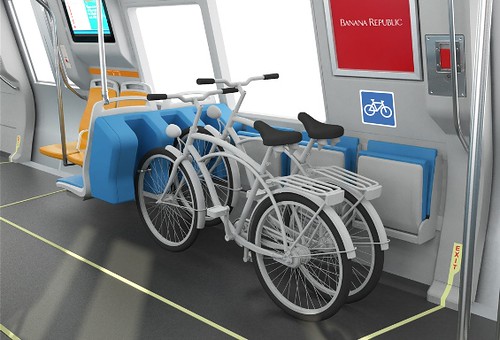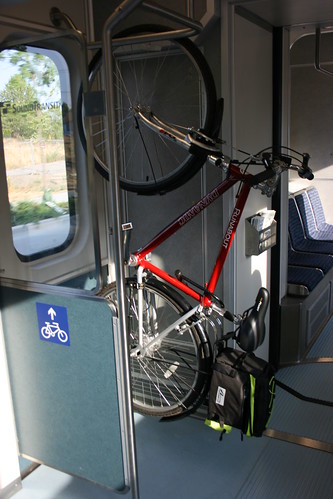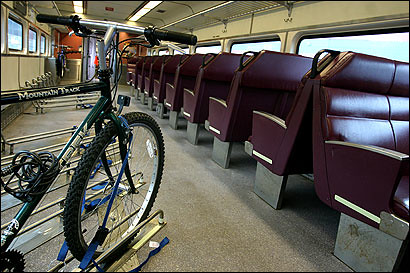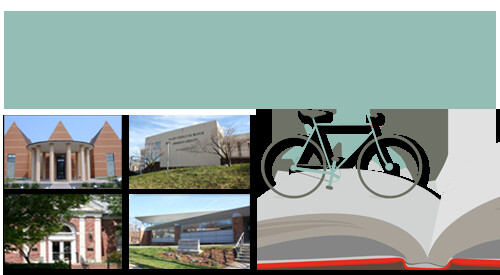Bicycling roundup #1: general
-----
Slight revision. This is too long so I am pulling out the bike sharing points into a separate entry.
-----
1. Fairfax County Advocates for Better Bicycling have a Bicycle Summit on Saturday November 2nd.
2. Speaking of investing money in high quality bicycle parking at public facilities, that's happening at the new Silver Line Metrorail stations, according to this entry, "Wiehle-Reston East bike room photos," from the Fairfax Advocates for Better Bicycling blog.
Left: photo by David Madison Photography.
3. To piss Mayor Emanuel off, a Chicago Alderman proposes a $25/year "bike fee." See "Chicago alderman wants $25 bike registration fee" from the Chicago Tribune. From the article:
South Side Ald. Pat Dowell, 3rd, floated a plan to charge bike owners an annual $25 registration fee as a way to raise millions of dollars next year and provide an alternative to the mayor's proposal to hike cable television taxes to bring in about $9 million. Dowell also said she wants to require bikers to take a "rules of the road" safety class.In Illinois, it costs $99/year to renew an automobile registration and $30/four years for a drivers license. So that's about $107/year.
Most adult bicyclists already have a drivers license. Probably $25/year for a bike is too high--in DC it costs $35/year for a residential parking permit, compared to the much greater costs that a car imposes on the road network and environment. If the car renewal cost was at least triple the current rate, I would think a $25/year bike fee might be reasonable.
I am not opposed to a bike endorsement on a driver's license or bike fee But as long as automobile drivers are so significantly subsidized, especially for street parking, albeit not in Chicago, it doesn't seem reasonable to do so until automobiles pay more.
4. Gas prices are likely to drop because world demand has dropped in the face of a rise for diesel gasoline, and US vehicle miles traveled remains lower than historical highs. See "Gasoline Prices Skid as Diesel Burns" from the Wall Street Journal. So this will reduce the demand some for alternative forms of travel, including biking (and transit).
5. Slightly off topic, the courts have ruled that Rehoboth Beach, Delaware can charge $40/year for a motor scooter parking permit. See "Judge tosses suit alleging Rehoboth Beach scooter fee is unfair" from the Wilmington News-Journal. Note that's more than a DC residential parking permit fee for automobiles. From the article:
In the past, the resort allowed scooters to be parked for free at sidewalk bike racks, so scooter owners would coast up sidewalk ramps to do so. But town officials determined that was unsafe because it led scooter owners to believe all the town’s sidewalks were fine for parking, or even riding.Note that Rehoboth Beach's parking permit rates are significantly higher than DC's. I'll have to add them as an example to my list of better practices in parking ("Testimony on parking policy").
So in 2013, Rehoboth instituted a $40 seasonal parking pass for scooters resting in any unmetered street spots, and banned them from sharing bike racks on sidewalks. Myslewski’s lawsuit, filed in May, called this arrangement unfair.
6. Washcycle has an article in GGW, "New commuter benefits could help bicyclists," on DC's proposed transportation demand management legislation, which will require DC businesses having than 50 employees--but not the DC government--to provide workers with sustainable commuting benefits, which can include biking support.
7. In "Could Metro allow bicycles during rush hour?," Greater Greater Washington suggests that WMATA subway service could accommodate fixed wheel bikes during rush periods. BART in SF, which has about half the ridership of WMATA, just announced such a policy ("BART lifts bike bans permanently", SF Streetsblog).
I think it would be reasonable to do with bans on using particular stations--the most crowded one--such as Union Station, Metro Center, and Gallery Place (all of which have convenient alternatives).
Of course, it would be easier to do this if WMATA would put hooks or other bicycle accommodations in the train cars.
New bicycle racks on the BART train cars

Hooks on Portland light rail trains. Flickr photo by Atomic Taco.

Ironically, today after commenting on this thread, a station attendant tried to ban me from entering the New York Avenue station with my bike, at 3:39pm. I told her I was going to Takoma, so I'd be off by 4pm. She informed me, incorrectly, that bikes are banned during rush hour. I said, "no, bikes are allowed til 4pm." She got the bike brochure to show me. I found the correct info, said you're wrong, gave her the brochure, and continued... But I didn't get vituperative.
8. Amtrak tested carrying bikes on the train that travels between DC and Pittsburgh. See "Amtrak tests bicycle roll-on service on Capitol Limited route between Pittsburgh and DC" from the Pittsburgh Post-Gazette... it didn't make the Post. This route parallels the Great Allegheny Passage, from Pittsburgh to Cumberland, and the C&O Canal Trail from DC to Cumberland, and could serve vacationers who want to travel by bike one way, but not round trip.
Metrolink and Caltrain in California do this on a daily basis. MBTA runs certain trains with special bike accommodations on weekends. Called the Bike Train, certain VIA Rail trains running between Toronto and Montreal and from Toronto to Niagara Falls, Ontario have similar accommodations during tourist season.

The MBTA unveiled a commuter rail coach fitted with 39 bicycle racks. Officials also toured the first coach completed in a $23.5 million program to refurbish air conditioning units and old windows in 162 commuter cars. (William Moore/ Boston Globe Photo)
 9. Last Saturday the Alexandria VA Library System led a bike-based tour of its branches. I was remiss in not mentioning before it happened.
9. Last Saturday the Alexandria VA Library System led a bike-based tour of its branches. I was remiss in not mentioning before it happened. This is a perfect illustration of my point in my presentation on best practice (suburban) bicycle planning about using civic assets like parks, schools, recreation centers, and libraries as a locus for community bike touring and training. See "Best practice bicycle planning for suburban settings using the action planning method."
BikingTown DC does neighborhood cultural history bike tours. And BikeArlington does neighborhood bike events too. There is a cross-jurisdictional bike ride between Arlington and Alexandria by Bike Arlington and also WABA does a cross-DC ride called Bike DC.
But I am big on the neighborhood based events as a way to get people started.
10. Bicyclists considered by drivers to be whiners, when motor vehicle operators aren't seemingly capable of considering their own attitude and perspective as whining out of a supreme sense of entitlement.

This Frazz comic strip (9/28/2013) is pretty good and makes me think of how people complain about bicycle's using up space on the road, or complaining about cars parked in bike lanes. I give people a lot of slack, and it's very rare when I take the lane, although that is for defensive cycling purposes (see "Why I slow down (while biking) at intersections (and I don't worry about riding fast either)"), but this column, "EW Foot soldier declares war on sanctimonious cyclists," in the Toronto Star is kind of laughable even though on other issues I consider the columnist, Rosie DiManno, to be pretty good. She writes:
But at least drivers don’t have the virtue that’s been invested on cyclists, arguably the most sanctimonious breed on the planet: I cycle therefore I am divine. They have risen to No. 1 on my list of People Who Should Be Shot.
I get tired of cars blithely taking up the bike lane. I get tired of drivers complaining about bicyclists, without recognizing how much they demand in the way of subsidies.
I'm surprised the Toronto Star ran this. Then again, the New York Times ran that op-ed by Delia Ephron. As Bike Snob wrote about that:
Can you imagine if you were able to pick a subject you knew absolutely nothing about, write a batshit crazy opinion piece on it, and get it published in The New York Times as easily as a stoned college student calls in for a bucket of chicken wings?Note also that there has been similar entitlement-based writing by motor vehicle operators vis-a-vis bicycling in DC's good government e-newsletter, themail. I wrote a response, but it wasn't published.
Basically it comes down to the faster vehicle expects to be entitled to move faster and resents impediments presented by slower moving traffic, in this case, bicyclists. But believing that might makes right (in this case speed) isn't seen as entitlement.
It's the tortoise versus the hare.
11. DC parking regulations rewrite zoning hearing. On November 12th (full) and November 19th. To sign up, you can use the handy Coalition for Smarter Growth webpage app.
I haven't read the proposals yet, but I have signed up to testify. More later on this topic, after I read and write.
Labels: bicycle parking, bicycle sharing, bicycling, sustainable transportation, transportation planning




4 Comments:
There are different rebalancing situations in different bike share markets. In DC I think there is a lot of uphill avoidance, electrical bikes would help a lot with that. In NYC everyone wants to come to midtown during the day, electric bikes won't help.
I would love to see a system add an extra 25% capacity that is market priced, and use market pricing for rebalancing. Allow private entities to rebalance for the bikeshare system and pay them. Then the system can make money on the difference. Not only would I pay more per ride for such a system, I would pay more to be a member of such a system.
electric bikes are even more expensive and require battery replacement every 18 months, plus you might not be able to rely on solar for recharging.
Not sure if your idea could work. I'd be interesting to sketch out the ramifications more. My worry is that the increase in bikes for market pricing wouldn't get used because people wouldn't be paying for it.
I did try to develop a different model of higher prices, even a bit higher than what DC charges, for tourist/casual use, based on zip code. The idea is that people in the MPO geography are paying for the system one way or the other and could get a discount compared to out of the area users.
But in the current pricing system of all the Bixi systems, the only way to "make money" is to have a big base of itinerant users, people who are likely to be tourists, and the value of the experience and cost of alternative mobility methods is such that bike share is still a cheaper alternative even at higher prices.
Thanks for writing.
Although I am going to take the liberty of also moving these comments to the new entry that I calved off from the original.
for people coming from other sites, the bike sharing section of the original entry has been moved to http://urbanplacesandspaces.blogspot.com/2013/10/bicycling-roundup-2-bike-sharing.html#comments
Thank you for providing such valuable information and thanks for sharing this Business Promotion technique.
Post a Comment
<< Home